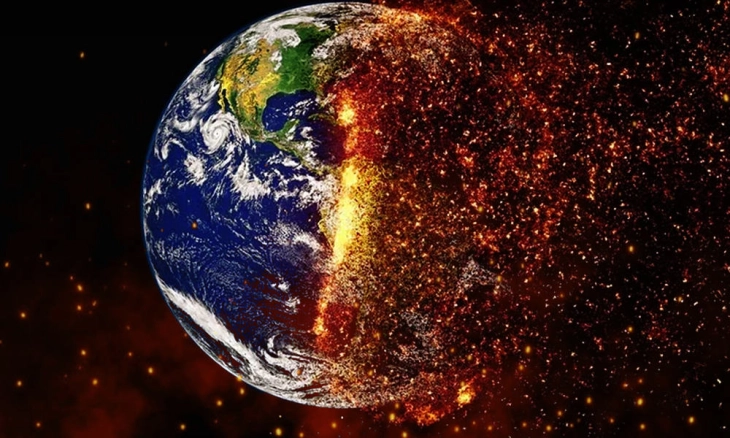UN report: Humans are changing the climate at 'unprecedented' rate

Geneva, 9 August 2021 (dpa/MIA) - An alarming report by a UN scientific panel called changes to the climate "unprecedented," said it is "unequivocal" humans are to blame, and laid out the case for drastic cuts to emissions in order to hold the global temperature to under the limits set by the 2015 Paris Agreement.
"The scale of recent changes across the climate system as a whole and the present state of many aspects of the climate system are unprecedented over many centuries to many thousands of years," said the report issued on Monday by the Geneva-based Intergovernmental Panel on Climate Change (IPCC).
The authors write that, given the available evidence, they have "high confidence" that atmospheric carbon dioxide concentrations were higher in 2019 than at any point in a least 2 million years, while the global surface temperature has "increased faster since 1970 than in any other 50-year period over at least the last 2,000 years."
The report was compiled by 234 experts from 66 countries and is the most comprehensive to be released by the UN panel since 2013.
The IPCC cites other historic human-driven climate trends, including that annual average Arctic sea ice between 2011 and 2020 was the lowest since 1850 and the global sea level has "risen faster since 1900 than over any preceding century in at least the last 3,000 years."
Human influence is "very likely the main driver" of the retreat of glaciers across the globe over the past three decades, the melting of Greenland’s mammoth ice sheet, and the decrease in spring snow cover in North America.
"The alarm bells are deafening, and the evidence is irrefutable," UN Secretary General Antonio Guterres said upon the report's release.
"This report must sound a death knell for coal and fossil fuels, before they destroy our planet. If we combine forces now, we can avert climate catastrophe."
The increase in the global average temperature will exceed the threshold laid out in the Paris Agreement "unless deep reductions in carbon dioxide and other greenhouse gas emissions occur in the coming decades," a major UN climate report projected.
In the 2015 Paris climate accord, nations set a target of staying below 2 degrees Celsius, and preferably to 1.5 degrees, above pre-industrial levels.
If not, the consensus is that extreme weather, including droughts and flooding, will become even more common, sea levels will rise, Arctic ice will diminish, and many plants and animals will be unable to adapt.
The IPCC report suggested limiting the temperature rise to those levels would require urgent, and drastic, action.
"Global surface temperature will continue to increase until at least the mid-century under all emissions scenarios considered," the IPCC wrote, referring to new climate model simulations that evaluate the impact of various rates of future annual emissions, from very high to very low.
Under the very highest emissions scenario, the global temperature was modelled to rise as much as 5.7 degrees by the end of the century. Under the very lowest emissions scenario the number could be kept to between 1 and 1.8 degrees by 2100 compared to pre-industrial levels.
"Global warming of 1.5 degrees Celsius and 2 degrees Celsius will be exceeded during the 21st century unless deep reductions in CO2 and other greenhouse gas emissions occur in the coming decades," the scientists wrote.
Human action has been more tightly linked to climate change in each of the previous five IPCC assessments.
Although those earlier assessments set off alarm bells among environmental campaigners and in some corridors of power, the world has continued to fall behind on its climate goals.
But a slew of recent disasters has once again underscored the urgency of the crisis, from the wildfires and heatwaves scorching southern Europe and North America's west, to widespread flooding in China and Germany.
The sixth assessment will be delivered in parts through 2022.
The second part of this IPCC assessment will deal with impacts, adaptation and vulnerability to climate change, while the third looks at mitigation efforts. A final document synthesizing the three earlier efforts will then be released at some point next year.







